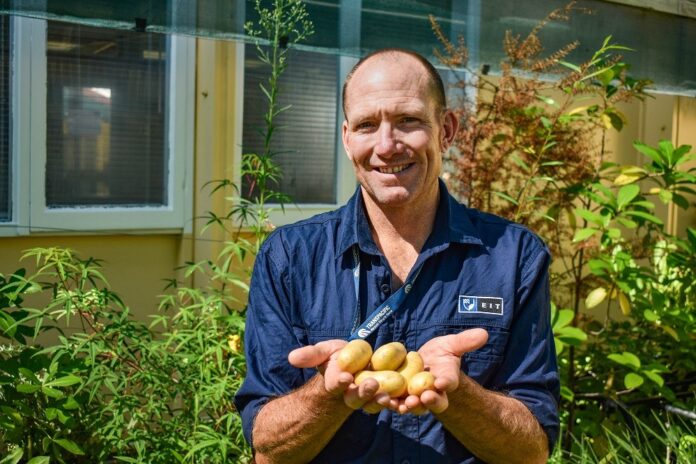Source: Eastern Institute of Technology – Tairāwhiti
8 mins ago
Aaron Williams is excited to teach on the Mahinga Kai course in Taradale.
From March 8, EIT will offer a free Certificate in Māori Traditional Food Production, Harvest and Management. Often just referred to as Mahinga kai, this 20-week programme that has been run successfully at multiple locations across Hawke’s Bay and Tairāwhiti, will be delivered for the first time at EIT’s campus in Taradale.
The Mahinga kai course will give learners the skills to sustainably grow and gather their own food by using traditional methods.
EIT tutors Aaron Williams and Chad Tareha (Ngāti Pārau) will share the teaching. They say that the course will not be dictated by a strict agenda, it will be about sharing knowledge, skills, and ideas.
Chad completed his Bachelor of Arts (Māori) at EIT last year. Chad is also the chairman of the Ngāti Pārau Hapū Trust as well as of the Waiohiki Māori Marae Committee. In addition, he serves on the board of the Marine Culture Health Programme for Napier Port. Over the past few years, Chad has become an active advocate for Māori concerns promoting culture and language.
Originally from South Africa, Aaron has studied te reo Māori and mātauranga Māori, and immersed himself in te ao Māori. Growing up on a vegetable farm, he followed in his father’s footsteps and studied horticulture and landscaping. He says that growing and harvesting his own food has been a big part of his life.
Aaron has always been advocating for sustainability and self-sufficiency. “It’s empowering to know where your food comes from and it gives you a sense of belonging. Needless to say that it saves you money. Financial freedom is an important step towards mental health. I also believe in learning traditional practices from our ancestors to feed us into the future.”
The learners will be guided by the maramataka, the Māori lunar calendar. They will explore the three sources of food, moana (ocean), maara (land), and ngahere (forest/bush). They will collect seeds to grow their own native plants and trees, and look into traditional ways of preserving, fermenting, and pickling. The course also includes a few field trips, e.g. to the beach to collect shellfish and seaweed.
The highlight is a kai event where the learners will prepare and serve the kai they have produced to whānau.




